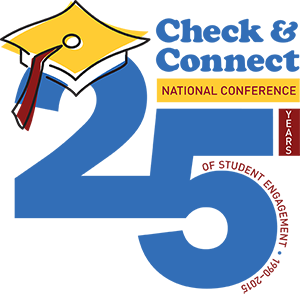

Main navigation | Main content

The following concurrent sessions – one of four themed tracks – took place at Check & Connect's first national conference, and slides from specific sessions are available below.
James J. Appleton, Ph.D., Director, Office of Research and Evaluation, Gwinnett County Public Schools, GA
Amy L. Reschly, Ph.D., Professor, Department of Educational Psychology, University of Georgia
Student engagement with school is a promising multi-dimensional construct. SEAs and LEAs must be able to efficiently collect, analyze and meaningfully report engagement information if it is to be useful. We describe the Check & Connect-aligned theory of the SEI, practical lessons learned, and results found over an eight year period with nearly 70,000 students per year. We include predictions to high school graduation and post-secondary enrollment.
See also The Student Engagement Instrument on the Check & Connect website.
Kent Pekel, Ed.D., President and CEO, Search Institute
Search Institute's newest applied research focuses on studying and strengthening the relationships that put young people on the path to becoming thriving young adults. Kent Pekel, Ed.D. will discuss his organization’s research on relationships between young people and adults and between young people and their peers. Participants will learn about the Developmental Relationships Framework and how SI is working to help strengthen these relationships through the discipline of improvement science.
Richard Krueger, Ph.D., Professor Emeritus, University of Minnesota
This hour will be jam-packed with tips about how to listen to key people: staff, volunteers, clients. How do you create an environment that says “we want to hear what you think and feel”? How do you create opportunities for people to share? How can you set up informal and formal ways to listen? How do you listen when people are emotional? How do you make sense of all this information? How can you help others on your team to become better listeners? These topics and more will be covered in this session.
Angie Pohl, Ph.D., Assistant Principal, Pillsbury Elementary, Minneapolis Public Schools
Cognitive engagement is a subtype of student engagement that is difficult to observe and often perceived as difficult to target for intervention. Through information sharing and interactive activities, this session seeks to make promoting cognitive engagement easier. The following questions will be addressed in this session: What is cognitive engagement? Why is it important? How is it related to school success? What are some strategies I can use to promote cognitive engagement?
 View PDF of Presentation | Download ZIP File of Handouts
View PDF of Presentation | Download ZIP File of Handouts
Amy Susman-Stillman, Ph.D., Co-director, Center for Early Education and Development (CEED)
Karen Storm, Ph.D., Research Associate, Center for Early Education and Development, University of Minnesota
Preparing young children for success in school, particularly those at-risk for educational disparities, includes ensuring families have the knowledge and resources to promote early learning, children consistently attend preschool, and children participate in developmentally appropriate learning opportunities at home and school. In this session, we will discuss innovative models of home-school partnerships and how they are being used with families to promote preschool attendance, student and family engagement in school, and children’s school readiness.
Please contact Amy Susman-Stillman if interested in this presentation at asusman@umn.edu.